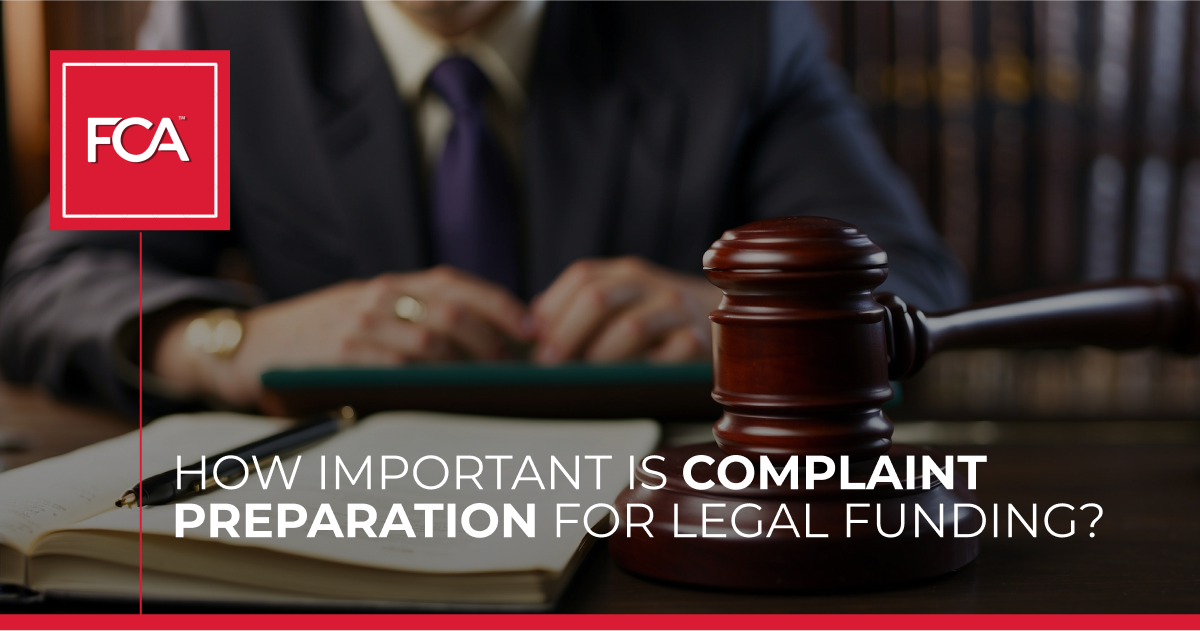Before you can apply for legal funding, complaint preparation is a necessary step. Filing a civil complaint is also the first step of the litigation process. But it’s not as simple as it sounds. It requires multiple documents and extensive legal knowledge to present the facts of your claim correctly. These facts are also used by the legal funding company to assess the merit of your case and to approve your application for a cash advance. Therefore, it’s extremely important to get this part right.
Legal Funding and Complaint Preparation
You must file a complaint, obtain medical and police reports, and have a demand letter (and complete other steps to begin your lawsuit), before applying for legal funding. Since the complaint preparation process can be complex, it’s best to have an attorney’s help. You’ll need an attorney if you’re going to apply for legal funding anyway.
What Does a Legal Complaint Look Like?
To file a legal complaint, one must provide relevant details on forms provided by the court. These forms have a specific template and include:
- Civil Cover Sheet: Solely used for court records, the civil cover sheet provides information about the plaintiff and defendant. It includes the case number and specifies if a jury trial is being requested. This is the first form of the complaint.
- Summons: A two-page document, the summons is served to the defendant and includes details about who is suing them and why. The summons with proof of service also identifies the court through which the process is being handled and how the defendant was served. It must be signed by the Court Clerk.
- Application to Proceed in Forma Pauperis: This application form is filed after the defendant is served. It requires personal information about the plaintiff (employment, income, etc.) and details about the case. There is a fee to file this application unless the party filing it is eligible for a waiver.
What Must a Legal Complaint Prove?
A complaint must contain information that backs your claim against the defendant. While it must also specify the remedy you’re seeking, its format follows the same principles of proving negligence that any legal case must follow. To prove a wrongdoer was negligent, you must show:
- They Owed the Plaintiff a Duty: A duty is your legal responsibility to avoid causing someone injury or acting in a way that can harm them. For example, drivers have a duty to obey rules that prevent them from causing accidents or putting others in danger.
- They Breached This Duty: If someone was allegedly driving while impaired and caused an accident, or failed to clean or repair a sidewalk and a passerby was injured for that reason, the defendant may have breached their duty of care.
- This Caused an Injury: Causation examines whether the damages the victim suffered were caused by the wrongdoer’s breach of duty and, given the breach occurred, if the type of injuries suffered could have been predicted.
- The Victim Suffered Damages: A lawsuit can pursue a defendant for monetary damages (medical bills, lost wages, etc). Non-economic losses, including pain and suffering, can also be pursued. In some cases, punitive damages that deter a wrongdoer or the community from willful misconduct can be awarded.
What Happens After Filing the Complaint?
If drafting the complaint seemed time-consuming enough, you’ll then have to wait for the court to respond. The court can accept or deny the documents. Once the defendant is served with the complaint, they have 21 days to respond, after which both parties (and their attorneys) meet with the judge. The purpose of this conference is to review the details of the case and set a schedule.
Why Is Complaint Preparation So Challenging?
There are many factors to consider when filing a complaint. These include submitting the documents to the court by a specified deadline. Other considerations include:
- The court’s instructions must be followed precisely.
- Written facts and claims must be complete, yet simple to read.
- The document must explicitly state the plaintiff’s demands.
- Two copies of each completed form must be submitted.
- After the complaint is reviewed, a signature is required.
- Every page must be numbered.
Which Court Do I File a Complaint With?
Claims must be filed in the proper court. Otherwise, they will not be considered, no matter how meritorious they are. The court must have jurisdiction over the complaint and the subject matter. It’s usually the court in the state where the plaintiff or defendant resides or where the alleged acts or harm occurred. If the claims are between citizens of different states (and damages exceed a certain amount) or allege violations of federal laws, a federal court will have jurisdiction over the complaint.
What Are the Benefits of Attorney Complaint Services?
You can reach out to a service provider for legal funding and complaint preparation services. Fund Capital America provides various lawsuit document services that can save time. Our trained, knowledgeable staff is well-versed in different types of cases. They review the plaintiff’s claims, relate them to applicable laws, and quickly complete all forms in detail. All forms are also submitted to the court.
Contact Us for Legal Funding, Complaint Preparation, and Other Litigation Support Services
Fund Capital America is a one-stop shop for legal services. Whether your firm or practice needs help with legal funding, complaint preparation, insurance policy limit research, medical record retrieval, demand letter preparation, or other steps, our team can take these on so you can focus on other tasks. We also provide a range of lawsuit funding and personal injury cash advance options. To apply or pre-qualify, or learn more about our complaint preparation package, call (855) 870-2274 today.



